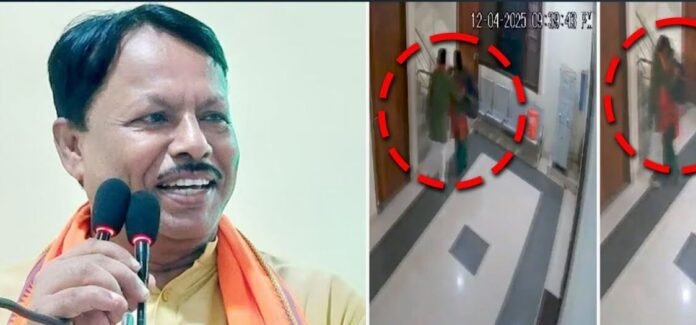BJP issues show-cause notice to Gonda district chief Amar Kishore Kashyap over ‘obscene act’ caught on CCTV
A scandal has erupted in India’s Uttar Pradesh after a video went viral showing local BJP leader Amar Kishore Kashyap allegedly engaging in an “obscene act” with a woman at the party’s Gonda district office. The footage, captured on CCTV on April 12, has triggered public outrage and led the BJP to issue a show-cause notice demanding a written explanation within seven days.
The video shows Kashyap, president of BJP’s Gonda unit, ascending a staircase with a woman closely behind him. At one point, he turns and embraces her before continuing upward, while she follows. The woman is reportedly a fellow BJP worker.
In the wake of the controversy, Kashyap denied any misconduct. Speaking to the Press Trust of India (PTI), he said the woman was feeling unwell that day. “She requested a place to rest. While we were climbing the stairs, she felt dizzy, so I supported her. This video is being misused by my political opponents to damage my image,” he claimed.
Despite his explanation, the footage caused significant unease within the party ranks. One BJP worker, disturbed by the visuals, filed a formal complaint with the state leadership, calling the clip “shameful” and urging immediate action.
Acting swiftly, BJP’s Uttar Pradesh general secretary Govind Narayan Shukla issued Kashyap a show-cause notice. “The video circulated on social media has brought to light conduct that negatively impacts the party’s reputation and falls under the category of indiscipline,” the notice stated. “You are required to submit a written explanation within seven days. Failure to do so or an unsatisfactory response will invite strict disciplinary action.”
The episode places the BJP in a difficult position ahead of key state and national political events. Gonda has been a significant seat for the party in recent elections, and the scandal could impact its grassroots support if left unresolved.
The incident has also sparked a broader debate across social media. While some BJP supporters have defended Kashyap, citing possible misinterpretation or political sabotage, critics argue that accountability must be enforced regardless of status or intent, especially when conduct occurs on party premises.
Women’s rights groups have called for a transparent investigation, warning that party offices must remain safe spaces for workers. “Whether the woman was unwell or not, the visual impression created is inappropriate, and it undermines women’s confidence in political workplaces,” one activist noted.
This controversy adds to a series of recent scandals involving Indian political figures caught on video in compromising positions. With increasing surveillance and public scrutiny, even district-level politicians are under constant watch, and such incidents are quickly amplified online.
Kashyap, as of now, remains in his post but under pressure. The BJP’s state leadership will review his written explanation next week and decide whether further disciplinary action, such as suspension or removal, is warranted.
Meanwhile, the woman seen in the video has not released a statement. It remains unclear whether she will come forward publicly or provide a statement to party officials.
As the BJP attempts to manage the fallout, the party will be keen to show its commitment to discipline and ethical standards, especially with critics quick to point to double standards in political accountability.
The next few days could determine the political future of Amar Kishore Kashyap—and whether BJP can contain a local scandal before it becomes a national embarrassment.
